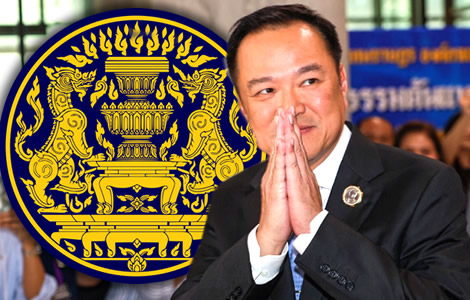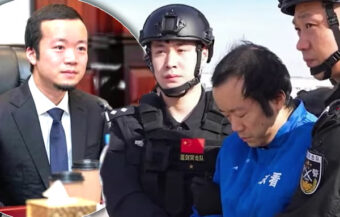Anutin strikes back as former deputy PM defies all odds to become Thailand’s next Prime Minister, sparking shock and fury nationwide after Thaksin departs, leaving the nation in disbelief over the sudden political twist and high-stakes power struggle.
In a twist only Thai politics could produce, the former deputy prime minister, who just last week dismissed any chance of becoming Prime Minister, was elected to the role by the House of Representatives. The vote came barely 24 hours after former Prime Minister and Pheu Thai Party leader Thaksin Shinawatra departed from Don Mueang Airport on a private flight that could lead him into exile. The drama follows Thaksin’s earlier push to remove Anutin from the Interior Ministry at the end of May, highlighting a high-stakes power struggle that has left people watching in disbelief.

Months after resigning as Minister of the Interior over the controversial Hun Sen audio clip, Anutin Charnvirakul, leader of the Bhumjaithai Party, was elected Thailand’s 32nd Prime Minister by the House of Representatives. At 3:51 pm on Friday, he passed the 247-vote threshold required for the position and is expected to secure up to 289 votes in total. This vote followed an extraordinary two-hour debate, which highlighted sharp divisions within Parliament and drew widespread national attention.
The parliamentary session convened under Speaker Wan Muhammad Noor Matha, who presided over the 26th House, Year 3, No. 20, First Ordinary Session.
Bhumjaithai and Pheu Thai nominate candidates as Parliament begins heated debate on leadership vote
Initially, at 9:40 am, MP Nan Bunthida Somchai of the Bhumjaithai Party proposed expediting the debate on the election of a Prime Minister to allow a quicker vote under Article 159 of the Constitution. Consequently, the motion passed at 11:20 am with 313 votes in favour, 142 against, four abstentions and five members absent.
Later, at 12:05 pm, MP Chaichanok Chidchob, Secretary-General of the Bhumjaithai Party, formally nominated Anutin as the party’s candidate. Meanwhile, Sorawong Thienthong, MP and Secretary-General of the Pheu Thai Party, nominated Chaikasem Nitisiri. Following these nominations, MPs were given one hour to debate the merits and qualifications of each candidate. The debate was intense, revealing sharp partisan divisions.
Supporters of Anutin emphasised his work along the Thai-Cambodian border. Suratin Picharn, leader of the New Democracy Party, highlighted his humanitarian “Heart with Wings” missions. He praised Anutin for assisting border communities and delivering aid directly. Moreover, Picharn noted that border residents expressed hope for peace and stability. He argued that Anutin’s leadership could restore security and prevent further border tensions.
Kla Tham Party MP Akkhasan Khiri Loweera also supported Anutin. He argued that electing him would overcome accumulated political uncertainty. Additionally, he stressed the need for constitutional amendments to return power to the people quickly. He emphasised that this vote aimed to stabilise governance while upholding the nation, religion and monarchy. Consequently, the Kla Tham Party formally announced its support for Anutin.
Pheu Thai party highlights Anutin’s lack of qualifications and warns that the government could remain unstable
In contrast, Pheu Thai Party members fiercely opposed Anutin. MP Chaturon Chaisang argued that Anutin lacked proper qualifications. He cited the Bhumjaithai Party’s five-point agreement with the People’s Party.
He described Anutin as a “puppet” manipulated by political alliances, which undermined democratic principles. Moreover, Chaisang warned that an Anutin-led government would remain unstable without a true parliamentary majority.
Adisorn Piangket, another Pheu Thai MP, raised concerns about rumours involving ฿1.5–฿2 billion in parliamentary funds. He demanded clarification, stating that transparency and ethical conduct were essential for the Prime Minister.
Additionally, Piangket challenged Anutin to take an oath at Wat Phra Kaew to prove his innocence. He argued that Chaikasem Nitisiri would be a more credible candidate, able to form an interim government and restore public trust.
Dr. Cholanat Srikaew, a Pheu Thai MP for Nan, criticised the process. He argued that electing Anutin violated democratic principles and the Constitution.
Furthermore, he warned that the Bhumjaithai Party’s deal with the People’s Party could consolidate extra-systemic power. He claimed the agreement effectively traded 14 million votes for political expediency, undermining public representation.
Smaller parties emphasise legal safeguards and highlight Anutin’s humanitarian achievements to support him
Meanwhile, Wittaya Kaewparadai, MP for the Ruam Thai Sang Chart Party, addressed legal considerations. He noted Chaikasem’s earlier resignation in 2023 due to health issues. Furthermore, he stressed the need for Anutin to clarify positions on Sections 1, 2, and 112 of the Constitution.
He warned that any interference with judicial institutions could destabilise the government. Additionally, he underlined the importance of maintaining Parliament’s independence during sensitive legal processes.
Bhumjaithai Party MPs highlighted Anutin’s humanitarian achievements and commitment to national interests. Rangsikorn Timatrika praised his “Heart with Wings” initiative, emphasising his dedication to public welfare. Krawee Prisananantakul noted that legal proceedings involving Anutin were ongoing, and he had not been deemed a suspect. Therefore, the new Cabinet was expected to respect judicial independence.
Despite these arguments, opposition MPs remained highly critical. Suthin Khlangsaeng, Pheu Thai Party MP, emphasised the selection of a Prime Minister must uphold dignity, legality and ethical standards.
He expressed concerns about Anutin’s alleged involvement in the senator collusion case. Furthermore, he argued that unresolved legal issues must be addressed before royal submission for approval.
Justice Minister’s scathing critique of Anutin, while the People’s Party explains the minority government plan
Justice Minister Pol. Col. Thawee Sodsong, leader of the Prachachat Party, delivered a scathing critique of Anutin.
He argued that Chaikasem demonstrated clear integrity, while Anutin lacked proven standards. Thawee highlighted Anutin’s alleged involvement in collusion cases with senators before the Election Commission and the Department of Special Investigation. He also cited the mismanagement of national assets, particularly the Khao Kradong land scandal. Consequently, he urged caution to preserve judicial independence and prevent political damage.
Natthaphong Ruangpanyawut, leader of the People’s Party and House opposition, delivered a strategic perspective.
He stated that the biggest party supported Anutin’s election primarily to dissolve Parliament within the agreed timeframe. This, he explained, would enable constitutional amendments and the preparation of new elections within four to six months. He emphasised that the People’s Party acted pragmatically, seeking reforms and orderly elections rather than endorsing Anutin’s long-term leadership.
Chairman explained the voting procedures, after which Anutin secured enough votes as 32nd Prime Minister
After extensive debate, the chairman explained the voting procedures at 2:52 pm. The session began at 3:01 pm, with an alphabetical roll call to ensure transparency.
Of the 493 members present, 247 votes were required for election. By 3:51 pm, Anutin had secured enough votes and was officially approved as Prime Minister. The formal appointment awaits the Royal Command.
This election followed the Constitutional Court’s removal of former Prime Minister Paethongtarn Shinawatra on August 29, 2025. The court ruled 6–3 that she had ceased her duties on July 1, 2025. As a result, the entire Cabinet was dissolved, and a new Prime Minister was required.
The session highlighted deep partisan divisions. Supporters of Anutin stressed continuity, humanitarian work, and border security. Opposition members emphasised ethical, legal and judicial integrity. Both sides raised allegations of financial misconduct, collusion and influence over electoral processes.
Several MPs highlighted the broader implications of Anutin’s election. They noted that coalition dynamics, minority government status and legal cases would shape governance. Additionally, smaller parties played a crucial role in determining the outcome, demonstrating the fragmented nature of Thai politics.
Election signals urgent policy priorities and shocks pro-democracy supporters across Thailand
Observers noted the election also signalled immediate policy priorities. Anutin must address national security, border management and governance reform while managing ongoing legal disputes. His prior resignation as Minister of the Interior was cited as a principled decision demonstrating commitment to public trust.
These parliamentary events have left a large number of pro-democracy supporters in Thailand stunned. A party with only 3% of the party-list vote has had its leader elected as Prime Minister.
The role of the People’s Party in this affair has opened it up to criticism, which is only just beginning. The negative response is coming not just from Pheu Thai supporters, but also independent activists and, indeed, from some within the People’s Party itself.
In the meantime, the opposition has pledged continued scrutiny, particularly regarding constitutional amendments and election timelines. The next four to six months, according to Mr. Natthaphong, the People’s Party leader, will be good for democracy in Thailand. Of course, that remains to be seen.
Anutin Charnvirakul’s elevation to the top job could only happen in Thailand, where politics takes place behind closed doors. Certainly, this crucial decision evolved hidden from public view.
The byzantine and treacherous nature of Thai politics, therefore, renders it always likely to surprise. This turn of events will take a long time to understand and decipher.
Anutin previously denied any chance as Prime Minister as People’s Party motives come under close scrutiny
Only last week, for instance, Mr. Anutin insisted that the possibility of his becoming Prime Minister did not exist. Indeed, he poked fun at the suggestions on the basis that the numbers were simply not there. So how did this all change?
The key question is what drove the People’s Party to shun the candidacy of a former Attorney General with an unblemished record, Mr. Chaikasem Nitisiri. On Thursday, Mr. Chaikasem even promised to call an election immediately after being appointed Prime Minister. In short, there is a feeling that there is more to this than what is seen in the public domain.
Has Thaksin flown the Thai coop for the second time? All will be revealed next Tuesday before the court
People’s Party ready to elect Anutin Charnvirakul Prime Minister on Friday as election call is thwarted
Thaksin stirs up a hornet’s nest as he states that Pheu Thai should control the Ministry of the Interior
Friday’s decision comes as the culmination of a political crisis caused when Mr. Thaksin moved to oust Mr. Anutin as Minister of the Interior at the end of May this year. Within weeks, his daughter, former Prime Minister Paetongtarn Shinawatra, was mired in a scandal over a phone call with Cambodian leader Hun Sen. In turn, Anutin and his ministers resigned en masse from the government.
Ms. Paetongtarn was subsequently removed by the Constitutional Court late Friday, August 29th. This came after members of Thailand’s controversial Senate filed an ethics and suitability complaint against her.
The formal assumption of office by Mr. Anutin now awaits the Royal Command. This signals the start of a government tasked with navigating a challenging and indeed highly charged political and legal environment.
Join the Thai News forum, follow Thai Examiner on Facebook here
Receive all our stories as they come out on Telegram here
Follow Thai Examiner here
Further reading:
People’s Party meeting on Monday ended in chaos as it failed to decide on who it will support for PM
Strong case for Chaikasem Nitisiri to lead an interim government tasked with Constitutional change


















